Natalie Coughlin Berkeley's BestAlready a world-record holder, this University of California honor student is making a big splash in amateur athleticsBy Kim Goss Published: Spring 2003 On the surface, swimmer Natalie Coughlin is just like any other college student-athlete. She attends class, goes to swim practice and competitions, and enjoys simple hobbies such as cooking and photography. The difference is that Coughlin is an honor student at one of the most prestigious universities in the country and a world record holder that many experts predict will become the best female swimmer in history. A psychology major with a 3.5 GPA at the University of California at Berkeley, Coughlin is the ultimate role model. This 20-year-old junior from Concord, California, has broken five world records so far and has won everything short of an Olympic gold medal. She also has the unique distinction of being the first woman to break the one-minute barrier in the 100-meter backstroke. Coughlin’s accomplishments are acknowledged at every turn. Last year she was nominated as one of the five finalists for the Sullivan Award, which is presented to the national’s best amateur athletes (and which was won last year by “amateur” figure skater Michelle Kwan). But Coughlin confesses she may not even notice when a victory results in an award, “unless someone tells me when I’ve won something.” Awards and media attention are far less meaningful to her than earning the respect of her peers in her sport. “She’s the most talented female swimmer I’ve ever seen,” says Stanford women’s swimming coach Richard Quick. “She’s poised to become the cornerstone of the 2004 Olympic team.” Likewise, Mark Schubert, who is Southern Cal University’s head swimming coach and also is regarded as among the most famous coaches in history, has this to say about Coughlin: “Right now, she’s the most dominating swimmer in the US, male or female.” It’s all smooth sailing these days for Coughlin, but no one would have guessed it just four years ago. Rough Waters Coughlin was introduced to swimming just weeks after her birth, was taking swimming lessons when she was only 10 months old, and was entering competitions at age 5. She grew up to become that rare entity, a true teenage phenomenon. When she was just 15, for example, Coughlin became the first athlete in history to qualify in all 14 events at the Summer Nationals, finishing among the world’s best 100 swimmers in 12 of them. Then, the following March, she proved she was human. Coughlin found herself in continual pain from an injury doctors diagnosed as a torn labrum muscle in her shoulder. She was told that surgery was indicated to repair the damage, and that she might have to give up competing. “There were a lot of thoughts that I’d be done really soon.” But two weeks before the operation she got a second opinion from an orthopedist for the San Francisco 49ers, Dr. Michael Dillingham. Dr. Dillingham sent her to Active Care, a clinic in San Francisco that had helped superstar Jerry Rice recover from knee surgery. Coughlin elected not to have the surgery, choosing instead to spend the next year in rehabilitation. Although she couldn’t use her arms to any degree while she healed, she was able to kick, and her intensity led her to develop a powerful dolphin kick. Ray Mitchell, head coach of the Concord (California) Terrapins, comments that now no one can stay with her in the 100-yard events because she stays underwater for approximately 60 percent of the race. Brains Before Brawn With her injury healed, Coughlin resumed her training and concentrated on her studies. When it came time to select a college, her choice was Berkeley, under the watchful eye of Coach Teri McKeever, the head women’s coach at Cal Berkeley. Last year McKeever was named “Coach of the Year” by the American Swim Coaches Association. “There’s a tremendous amount of pride at Berkeley,” Coughlin offers, “ – pride in athletics and academics. A certain number of people never miss a football game. When you wear a Cal shirt and walk down the street, people all over yell, ‘Go Berkeley!’ It’s great to be a part of that.” Coach McKeever adds, “Natalie embodies what this university is about.” Coughlin has a full plate: on top of her full-time studies, she is committed to a rigorous training schedule that consumes up to five hours of her day (including plyometrics, pull-ups and heavy weight training exercises such as full squats – an individualized, high-tech program developed by Mary Dempsey, a strength coach at Cal). During her free time, however, she likes to surf, cook and do photography. And, every Wednesday, she goes home to Concord to have a family dinner with her father, Jim, a police sergeant; her mother, Zennie, a paralegal; and her younger sister, Megan. It might seem ironic that a swimmer of Coughlin’s caliber is so grounded, but then, maybe it’s a large part of her power. She knows, and the world knows, that she has the potential to become the best woman swimmer ever, but she doesn’t let the pressure drag her down. Coughlin’s firm grip on reality is balanced by an equally buoyant spirit. As she told USA Today reporter Jill Lieber, “If it all ended tomorrow, it’d be sad, but I could cope. I’ll be a success in life, no matter what.” With Coughlin’s positive outlook, success is a given. As a swimmer, she has many more miles ahead before she reaches her potential, but as far as maturity goes, Natalie Coughlin has arrived. |
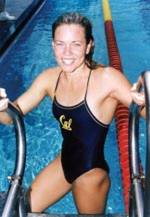 |
|
|
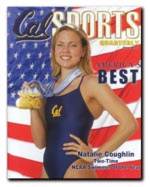 |
|
Natalie Coughlin is considered one of the greatest athletes ever at Cal Berkeley |
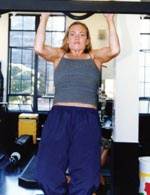 |
|
Pull-ups are a key strength exercise for Coughlin. |
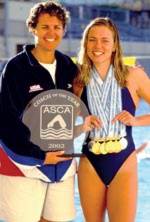 |
|
Coughlin with her coach, Teri McKeever |
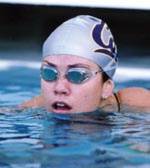 |
|
|